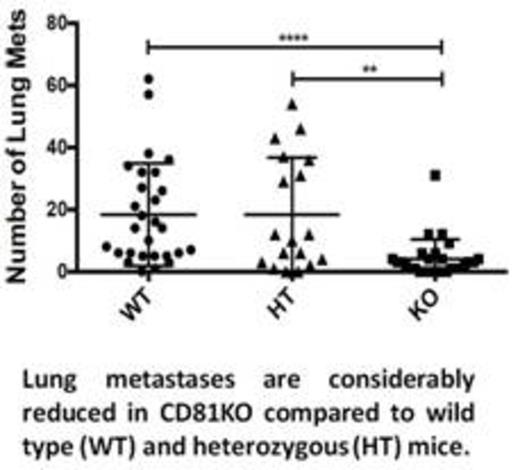Abstract
Tumor metastasis is the major cause of cancer mortality. While immune cells are aimed at halting metastases, the proliferating cancer cells at the primary tumor site recruit cells that counteract the adaptive anti-tumor immune response. Indeed, it is well established that tumors induce the accumulation and proliferation of immune suppressive cells, such as regulatory T cells (Tregs) and Myeloid Derived Suppressor cells (MDSC).
The tetraspanin CD81 belongs to a family of proteins that play an important role in the immune system as evident by impaired immune functions of DCs, B and T cells in several tetraspanin-deficient mice (CD37, CD81, CD151, and CD82).
While many studies have addressed the function of CD81 in infection and in the immune system, few have focused on its role in tumorigenesis and metastasis. Here we report that the growth of subcutaneously implanted breast cancer tumors (4T1) is slightly impaired in CD81 knockout (CD81KO) compared to wild type mice. Moreover, CD81KO mice develop very few lung metastases compared to their wild type and heterozygous counterparts.
Both wild type and CD81KO tumor-bearing mice show substantial increases in Tregs, and MDSCs. However, these Tregs and MDSCs differ functionally - those derived from wild type mice are effective suppressors of T cell proliferation. By contrast, Tregs and MDSCs derived from tumor-bearing CD81KO mice do not suppress the proliferation of Teff cells. Thus, it is highly likely that while Teff cells are greatly restrained by Tregs and MDSCs in wild type tumor-bearing mice, the impairment of both suppressive cell populations in CD81KO mice enables the anti-tumor function thereby opposing metastases.
No relevant conflicts of interest to declare.
Author notes
Asterisk with author names denotes non-ASH members.


This feature is available to Subscribers Only
Sign In or Create an Account Close Modal